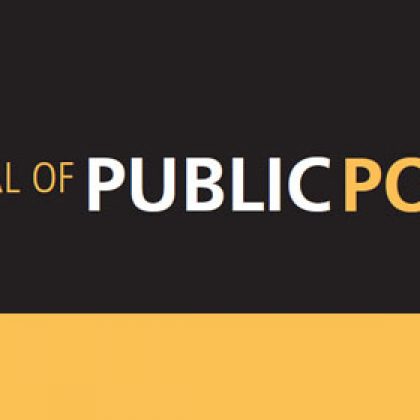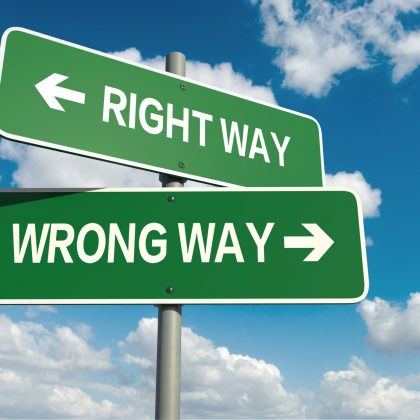Business Analytics: Methods and Cases for Data-Driven Decisions
Business Analytics, a new textbook from author and professor Richard Huntsinger is uniquely designed for both the business-oriented and data science-oriented student.…

Business Analytics, a new textbook from author and professor Richard Huntsinger is uniquely designed for both the business-oriented and data science-oriented student.…

In early 2017, only half of Washington, DC families receiving Temporary Assistance for Needy Families (TANF) successfully recertified their eligibility and maintained their benefits.…

Government policy performance is an important source of political trust. When governments perform well, the public is inclined to have high levels of trust toward them.…

In the Paris agreement, countries have committed themselves to decrease their carbon emissions drastically. Against this background, aviation has become an emblematic bone of contention since it is proven to be the most polluting mode of transport.…

When 43 students disappeared in the Mexican city Iguala in September 2014 during an attack of a joint group made up of local mafia and municipal police forces, a public outcry plunged the government of President Enrique Peña Nieto into crisis and decisively contributed to the defeat of his PRI party in the presidential elections.…

The digital sphere is consistently expanding, and now encompasses more than half of the world’s population with eight billion digital devices (Kemp, 2019).…

In a recent opinion piece on Bloomberg.com, Peter Orszag, former director of the Office of Management and Budget during the Obama Administration, suggested that the Covid-19 pandemic would be an unprecedented Political Science experiment that would test whether the threat of the virus could overcome the polarisation of American political parties.…

“I would like to be free, as a man is free. Like a man who needs to wander with his fantasies and who finds this space only in his democracy, that has the right to vote and spends his life delegating and in receiving commands has found his new freedom” (Giorgio Gaber, “la Libertà”, 1973) Delegation is a very common act in our everyday life: We delegate tasks to our colleagues in the workplace.…

The overexploitation and pollution of natural resources and accelerating climate change are among the greatest challenges of the present. Against this backdrop, industries are more and more prone to taking sustainability aspects into account.…

The world is currently facing the most serious health crisis in more than a century. While virtually all countries have been affected by the COVID-19 pandemic, there is some variation in the spread of the virus and the extent to which it has disrupted societies and economies.…

Policy is often depicted as prescription –a set of rules by which services and functions are carried out in the public sphere.…

In the past three decades, credit rating agencies have been in the limelight on more than one occasion, and not in a good way.…

Morality policies involve a controversial question of first principles or core values. Does gambling belong to this category of policies?

After decades of value change towards more egalitarian gender norms across most Western societies, the trend has now slowed, and even reversed in some countries.…

Much is being said, lately, regarding the effectiveness of EU policies, often arguing that their implementation is too poor or uneven throughout the Union.…

From the operation of a functioning health care system and the protection of the environment to the provision of jobs, social benefits and decent housing – citizens demand a lot from their elected governments.…

Around the world, policy-makers are confronted with various challenges originating from climate change, urbanisation, population growth, as well as technological and economic change.…

Social welfare policies are among the most salient and potentially controversial policies today. In virtually all western democracies, public support for the social safety net has changed significantly over time.…

Patients warned about the personal health risks of misusing medicine were almost twice as likely to heed the advice and take and it correctly, a new study has found.…

Regulations and regulatory change are a political process that is the product of the interaction between politicians, bureaucrats, the general public and interest groups.…

According to the mainstream literature related to governance change in higher education (HE),Western European governments have redesigned governance systems to make HE institutions more accountable by turning to a similar policy formula (the so-called ‘steering at a distance’ governance arrangement).…

Decision making in highly contentious public policy domains can become mired in political conflict, leaving important policy problems unaddressed. To remedy this, public agencies across levels of government are experimenting with non-traditional governance approaches that emphasize conflict reduction and negotiation among diverse stakeholders.…

Unified control of policymaking by a single political party is perhaps necessary, but not sufficient for observing policy outcomes consistent with majoritarian policy preferences.…

Much recent popular attention and research has been devoted to economic sources of individual support for right-wing populists. While there is considerable debate about the extent to which economic factors vs.…

Since the rise of regulation as a tool used by governments to intervene in different policy sectors in the late 1980s and early 1990s, countries around the word have established sector regulatory agencies to perform that task.…

Sven Steinmo states in his book Taxation and Democracy, “Governments need money. Modern Governments need lots of money.” This is no less true today than it was twenty-five years ago when he wrote it.…

In democratic countries, actors inside and outside the state have various channels for expressing their concerns and influencing policy agendas. In contrast, in authoritarian countries, less inclusive institutions lead to different dynamics of policy change.…

The 50 American state governments have been faced with many questions related to healthcare and immigration in the past two decades.…

The public sector serves a diverse citizenry across many different policy areas. To better serve their citizens, governments strive to develop routines and normalize service delivery.…

Currently, policymaking is torn between two demands. On the one hand, issues become increasingly complex, calling for the incorporation of expertise in the policymaking process and increasingly complex decision-making procedures.…

Networks of regulators are a well-established feature of the European Union system of governance. For a long time, the academic debate emphasised that networks were created in order to ensure a degree of convergence in regulatory policies across the EU, given the absence of supranational Euro-regulators.…

Inequities in the enforcement of environmental regulations are an important problem, as a number of studies show that ethnic minorities and low-income citizens are likely to suffer disproportionately from the effects of toxic waste, and air and water pollution. …

Why do some states have affirmative action policies while others do not? Much of the literature that examines this question is normative in nature or focuses on one state or a small number of states.…

As a nation, we are eating too much sugar. Consuming too many foods and drinks high in sugar can lead to weight gain and related health problems such as heart disease, type 2 diabetes and some cancers.

What if the greatest challenge facing regulation today is not erratic executive action, or lack of political will, or under-resourcing (though of course these matter)?…

Prostitution and assisted dying are highly contentious topics in German politics and many more countries around the world. Policy-makers commonly disagree on the “right way” of solving related policy problems.…

For what purposes should the government be able to take private property? When I first started writing about that question, I thought there was little chance anyone outside the United States would ever be interested in my work.…

A United Nations tribunal constituted under Annex VII to the United Nations Convention (UNC) on the Law of the Sea at Hague submitted its verdict recently on a unilateral arbitration instituted by Philippines on June 21st, 2013 questioning the validity of China’s “nine-dash line” claims in the South China Sea (SCS).